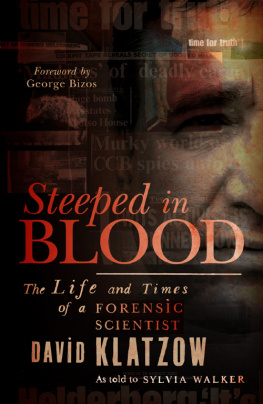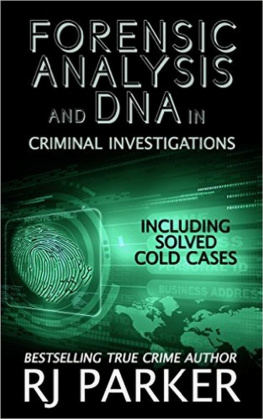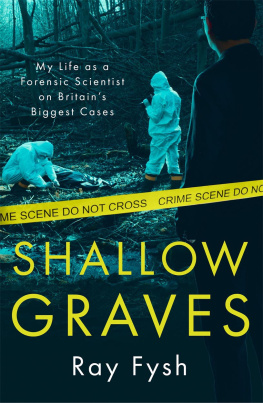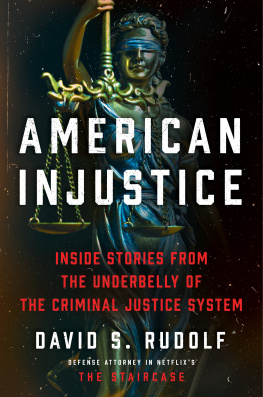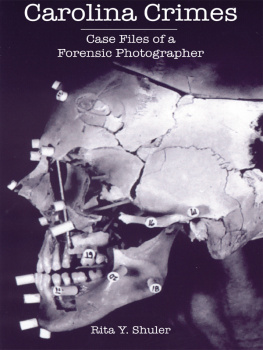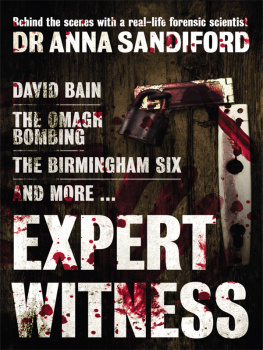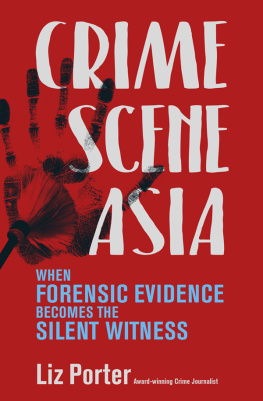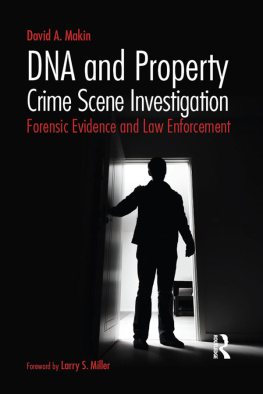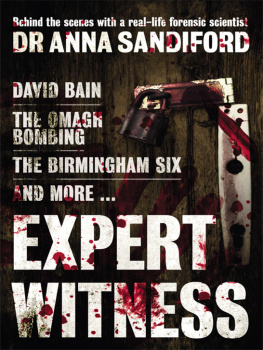Steeped in
BLOOD
The Life and Times
of a FORENSIC
SCIENTIST
DAVID KLATZOW
As told to SYLVIA WALKER
This book is dedicated to my wife, Shelona, whose hand on the rudder of my life has resulted in a calmer course, and whose assistance throughout my professional life has enabled my success; and to my children, James and Cathryn, who are the light of my life and the joy of my existence.
Heres freedom to him who would speak,
Heres freedom to him who would write;
For theres none ever feared that the truth should be heard,
Save him whom the truth would indict!
ROBERT BURNS
Nullius addictus iurare in verba magistri.
Quo me cunque rapit tempestas, deferor hospes
I am not bound to swear allegiance to the words of any master. Where the storm carries me, I go ashore and make myself at home.
HORACE
CONTENTS
FOREWORD
Justice often needs scientists to help her resolve vexed questions that arise when the truth has to be established. The mathematician, physicist, pathologist, chemist and other forensic experts in their disciplines are essential witnesses in proving where the truth lies. Often they are able to disprove the exculpatory versions put up by wrongdoers. Their evidence may lead to the conviction or the acquittal of an accused or the upholding or dismissing of a claim by a plaintiff in civil proceedings. Often the cause of an unnatural death has to be established.
Dr David Klatzow is pre-eminent among our few forensic experts. His academic qualifications and his experience of more than twenty-five years are evident in his numerous appearances as a witness in many cases, and as an advisor to both plaintiffs and defendants.
David and the late Dr Jonathan Gluckman, the countrys leading pathologist, were readily available to us in the Legal Resources Centre during the apartheid years and to the legal profession as a whole. Their evidence was vital to rebut the fairy tales made up by interrogators who tortured detainees, the policemen who shot dead peaceful demonstrators and the district surgeons who distorted their findings in post-mortem reports in order to avoid responsibility for the unnatural deaths.
On one occasion, five policemen testified that a teenager was shot with fine birdshot whilst he was part of a riotous assembly. The teenager denied it and maintained that he was standing with a friend at his grandmothers gate. The shooting had rendered him a quadriplegic. David Klatzow provided expert evidence to disprove the state case, as a result of which the judge disbelieved the policemen. The youth was awarded a high amount of damages, which would not have happened if the expert evidence had not been led.
Judge H.C. Nicholas had been a teacher of English before he became an advocate and thereafter a judge. He expected a high standard from counsel. After judgment, he paid tribute to David Klatzow not only for the clear and convincing evidence he had given, but also praised his eloquent use of the English language.
Some cross-examiners tend to undervalue expert evidence. They like to tell of the one crucial question Norman Birkett KC asked in the Burning Car case in the 1930s What is the co-efficient of the expansion of brass?
The expert witness conceded that he did not know. This was a devastating answer for the defence. The jury rejected the expert witnesss finding that the fire may not have been a deliberate act, and as a result the accused was convicted and sentenced to death. Birkett was subsequently criticised for having put an unfair question, but the expert witness should have asked Birkett, Can you tell me the precise proportions of the constituents [copper and zinc] before I answer your question, Mr Birkett? Birkett was not likely to have known, and the jurys verdict may have been different.
In this book, the author relates numerous examples of how conflicts of fact were resolved in the cases in which he testified. In most of these, his opinions were accepted. The judges complimented him on his expertise and his readiness to reconsider his opinion when new information became available during the course of a trial.
David Klatzow challenged sloppy investigation, drew attention to the lack of care in safeguarding a crime scene and exposed suspected cover-ups of serious crimes.
His scientific knowledge and investigative talents were used to good effect in investigating the tragic crash of the Helderberg, a case which has never been fully resolved. He courageously challenges the findings of Judge Cecil Margo and accuses the apartheid government of a cover-up.
The book contains most useful material for all who are interested in the administration of justice. No trial lawyer, senior investigating officer or potential expert witness can afford to ignore Steeped in Blood.
ADV GEORGE BIZOS SC
CONSTITUTIONAL LITIGATION UNIT
LEGAL RESOURCES CENTRE
PREFACE
It is difficult to tell ones life story. All too often, it can be seen as either an offensive and malicious criticism of past enemies, or an attempt to portray ones life in a more favourable light than is actually the case. My intention in this book is neither. I would like to record a story in stark relief, with the successes unadorned and the failures undiluted. Objectivity is, at best, a difficult thing to achieve. With the excesses and atrocities of the apartheid regime still so fresh in my memory, a difficult task is made doubly so I ask for indulgence where I stray from the ideal.
For some years now, I have appeared as a guest on radio shows that have been broadcast locally and nationally. In these talks I have attempted to tell a story of what occurred during a particular period in the political and historical life of South Africa. I have recounted events from my own perspective, as I can claim no wider insight into the greater scheme of past politics in this country than anyone else. I did have the incredibly good fortune, however, of being catapulted into the maelstrom of forensic science practice in 1984, during a very turbulent period of our history. By virtue of the fact that there was no one else, I became involved in some of the most high-profile and interesting cases that have passed through our courts in the past twenty-six years.
During the radio shows mentioned above, listeners have phoned in to ask me to write the story of what had happened in those mad times. This is an attempt to place on paper my experiences and the insights that they have brought. The book has been written to entertain and to inform; it makes no claim to academic rigour. It describes some of the cases that involved the criminal activities of the state and it explains the methods that I used to investigate these cases. It also discusses many of the non-political cases on which I have worked over the past two decades, including fire investigations, murders and a wide range of other forensic analyses. In many instances, the criminals who committed the awful deeds I investigated have been brought to justice. In other cases, that process is just beginning.
I write this not to criticise and denigrate some of those who were involved, but rather to tell the tale as I saw it. I hope that the insights I have gained and my telling of them will, in a small way, inhibit the repetition of the grotesque abuse of state power that I was witness to during the terminal years of apartheid rule.
I learnt the profession of forensic science as I went along: I was fortunate in starting with a large bag of luck filled to the brim coupled with my bag of experience, which was quite empty. My great good fortune was to get a significant quantity of experience into that bag before the bag of luck emptied.

